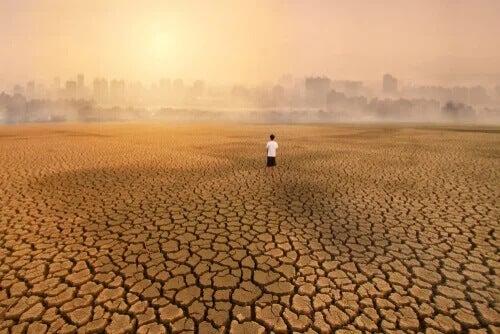The climate crisis is a reality. The poles melt, the species die at a breakneck pace, while ecosystems undergo changes and are destroyed, raising two problems: humanitarian conflicts over the control of certain resources and concern about their scarcity, this concern affects each person differently, but for some it can become so profound that they are directly affected by life , as is the case with those with eco-anxiety.
This concept, also known as climate anxiety, was born from the need to name chronic fear of environmental destruction. Concern about climate change and its consequences on nature as a whole can be seen as a source of stress that adds to the concerns of daily life.
- Eco-anxiety can be caused by two reasons.
- On the one hand.
- By being forced to leave the place of origin or by being aware of having such a developed environmental awareness that it leads to psychological discomfort.
According to a report published by the European Union, around 26 million people are affected each year by climate disasters: floods, fires or violent storms.
There are people in some areas who are forced to emigrate because of these events, for example, one in ten people living on islands such as Tuvalu and Kiribati end up becoming climate refugees.
As a result of the environmental changes we are experiencing and causing, much of the biodiversity is being lost, resulting in a lack of resources in some places.
As a result, it is increasingly difficult, if not impossible, to reside in these areas. As a result, the United Nations estimates that around 1. 5 billion people will have to travel to survive.
In addition to the change they face from having to change places of residence, these people who migrate by force suffer when their land and environment are destroyed, which can create enormous concern and frustration.
People who are attached and aware of nature are affected by emotional turmoil, which is also accompanied by a sense of frustration due to the limited power of individual actions, so there are people who are actually suffering the effects we have on the planet.
An example of this is the current effect on adolescents and young people. An Oxford clinical psychologist has discovered that many tweens suffer from ecological anxiety.
This is because children are more likely to understand and accept the idea that humans are responsible for these climate changes. As a result, they end up experiencing emotions such as resentment toward their elders that could have diminished impact, frustration, fear, and sadness.
On the other hand, it is surprising how affected environmental scientists are, in this sense Joe Duggan launched a survey in 2014 for scientists in which they must respond to what climate change has made them feel.
The results showed more of the same: despair, fear, despair and concern. In fact, British scientists recently published a letter in the prestigious scientific journal asking for psychological help to better cope with the negative results of their studies.
The consequences of climate change are numerous, in addition to eco-anxiety. By focusing on psychological aspects, these variations can lead to physiological changes that, in turn, affect people’s well-being. Our most basic physiological processes?How to sleep or feed?we?we are strongly influenced by nature.
Sunlight, for example, and temperature affect circadian rhythms and regulate neurotransmitters that influence our health and mood, so radical changes in our environment compromise our body’s balance at all levels.
Natural disasters and high temperatures are also closely related to psychological disorders, such as anxiety or mood disorders, for example, rising global temperatures are already having an impact on mental health.
A study published in Nature reported that this increase is related to suicide rates. Another example would be another study that identifies how pessimism increases in the face of considerably high temperatures.
For our part, in order to reduce the problem and our discomfort, we have the power to perform three simple actions:
Faced with this situation, which can little change if we do not act immediately, experts recommend the promotion of resilience mechanisms, that is, to understand the problem as a multidimensional element.
Therefore, the best measure to reduce eco-anxiety would be to properly inform and train the population, giving everyone the opportunity to be part of the solution.

